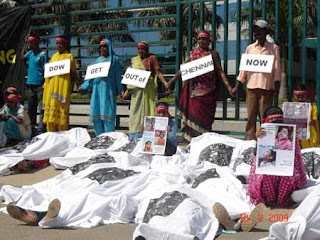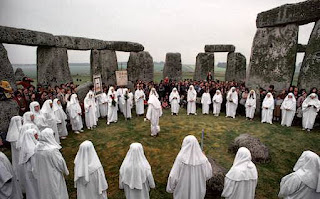The first Glastonbury Festival was a bit of shock for the sleepy Somerset market town. Suddenly the conservative townsfolk were confronted with the whole panoply of counter-culture alternative types. There were long haired bohemians, advocates of free love, spiritualists and vegetarians. Even worse, many were rumoured to visit the Tor after dark, get their kit off, and engage in idolatrous pagan rituals. It was all rather too much for them all, especially as it was 1914.
Ninety five years later, despite rumours of it selling out and becoming middle aged and middle class, the spirit of Gwyn Ap Nudd, Lord of the Otherworld, still rules the Glastonbury Festival. In 1914 the tickets may have been a bit cheaper and the security less intrusive, but the same rebellious subculture would appear to be at world. However whilst todays festival goers came to hear up-tempo beat-combos, those first festival goers actually came to see an opera.

It’s difficult to associate the world of British classical music with the neo-pagan hedonism of the Glastonbury Festival. However, over the last hundred years or so, there has been a seam of paganism running through British classical music, and every now and again it broke the surface. Even our most revered composer, the stately figure of Sir Edward Elgar, whose whiskers adorn the Twenty Pound note, turns out to have dabbled with non-Christian deities.
Whilst Elgar never actually composed an opera, he did write choral works, which I suppose are operas with no costumes or scenery (or acting - but then there’s often little enough of that in a real opera). His foray into pagan territory was Caractacus, the story of the Celtic anti-Romanisation protestor. This being Elgar there is lots of pomp and patriotism, but there are also tender, melodic moments celebrating the beauty of the Malvern hills. The pagan highlight of the piece is Lord of Dread, sung as Caractacus visits the temple of Taranis to ask for some divine help in smiting Romans.

Written in 1898, a time when Elgar was approaching, but had not yet reached, his peak, Caractacus is a little bit forgotten nowadays. However it is the sort of piece that local choral societies like to put on, so you may be lucky enough to catch a local performance in your neck of the woods. Choral societies being what they are though, you might have to live with balding ‘Celtic Warriors’ and greying ‘Druid maidens’.
Elgar went on to greater works, and was soon performing in London, then the beating heart of a great industrial empire. The dawning of the twentieth century though, saw many British composers turning their backs on the metropolis to seek their inspiration in the countryside. Men like Ralph Vaughan Williams were raiding the repertoire of folk musicians for tunes, whilst others like Gustav Holst, whose Planets Suite is more about pagan gods than astronomy, were discovering spirituality, in his case Hinduism.
To the high brow music snobs this has become known as the ‘cowpat school’ of music. Some of these cowpat composers weren’t afraid to use the P word in public. Granville Bantock (1868 - 1946) wrote something he called a Pagan Symphony. This was inspired by Classical Greece but for his later and better works he was inspired by Scotland.

Sir Arnold Bax (1883 - 1953) went even further, openly called himself a pagan - although he probably didn’t mean it in quite the same way as me. The titles of some of Bax’s works give you an idea of what he was into: Tintagel, The Garden of Fand, In The Faery Hills, Nympholept - although this last one was actually about woodland spirits, not what you may be thinking.
This was the time of the literary movement called the Celtic Twilight, after W.B. Yeats’ book of the same name, and being a Celt was suddenly cool. So with music and literature both becoming all Celticy and Otherworldly, it was only a matter of time before someone put them both together and made an opera.

The man who did the surgery was a grocer’s son from Aylesbury in Buckinghamshire, one Rutland Boughton. His influences were Marxism and the music of Richard Wagner.
Since his death in 1883 Wagner’s memory and his music had been kept going at the annual Bayreuth festival. Boughton, a self taught musician and card carrying communist, wanted to create an English Bayreuth, where the legends of England could be set to music and Glastonbury was the perfect spot.
The result was the first Glastonbury festival, which kicked off at 8PM on 5th August 1914 in the Glastonbury Assembly Rooms. Not put off by the fact that Britain had declared war on Germany the previous day, the audience watched dances and listened to a few songs and a spot of Wagner. The grand finale of the festival though was Boughton’s Celtic masterpiece, the opera The Immortal Hour.
The Immortal Hour now has it’s place in the history books as when it eventually moved to London it was performed for a record breaking 216 consecutive nights. By then it had a full orchestral score and scenery. In 1914 the vanguard party of Boughton’s musical revolution consisted of a handful of friends, some local amateurs, a costume designer he later married and a single piano for accompaniment. The original idea though was that it should be performed out of doors, with the chorus that starst the second act sung by a party of druids as they made their way through the trees towards the stage.

The story had come from the poem of the same name by Fiona McLeod, who was one of the more interesting Celtic Twilight writers. She was actually a bloke from Scotland called William Sharp, a moderately successful writer who suddenly found the need to write in a completely different style under a completely different name. Sharp always maintained that McLeod really existed, and in a sense she did. Sharp paid a high price for living this dual life, but as McLeod he produced some inspiring, and very pagan, poetry. As well as bringing back to life the Old Gods, McLeod added a few new ones for good measure, and such was her mastery of the myths that you can’t really spot the join.
Boughton was the sort of naive communist who continued to believe in Potempkin Villages long after everyone else had read Animal Farm and realised Stalin was a mass murdering psychopath. Working away in his cottage in the woods at Grayshott, Hampshire, Boughton appeasr to have been rather more influenced by the gentle, rustic English socialism of William Morris.
He tidied up McLeod’s poem dramatically, and the result is the story of Etain, a lady of the Sidhe, who is found wandering in a daze by Eochaidh, King of Ireland, who marries her. But after a year and a day of wedded bliss she is claimed back by Midir, a Prince of the Sidhe. Etain can’t resist his faery charms and returns to the Land of the Ever Young. Eochaidh, overcome with grief, loses his life to Dalua, the Fairy Fool and Lord of shadow whose machinations have brought all this about.
Musically, although there are influences of Wagner, the opera is very English. Compared with the full-on assault on the senses that is a Wagnerian opera, Boughton tells his story by means of folksy songs and choruses. The most popular of these is the Faery Chorus, the haunting tune that follows Etain from the land of the Sidhe and then lures her back. Over the course of the opera practically ever major Celtic deities gets a name check in one song or another.
The proletariat liked it and the festival was a success. Rather to Boughton's annoyance the aritocracy liked it too, although they generally got completely the wrong idea of what it was about. Boughton, it seems, felt rather sorry for poor old Eochaidh, dumped for no better reason other than his parents weren't immortals, but opera loving ladies generally preferred Etain, perhaps in the hope that they too would hear a fairy chorus summoning them back to the Otherworld.

After a break for the Great War the festival was back in 1920. This time Boughton unveiled The Birth of Arthur, the first of what he hoped would be his ‘Ring Cycle’; a series of five linked Arthurian operas. As the 1920s went, on some serious high-brow names started to show up, including George Bernard Shaw, D.H. Lawrence and Thomas Hardy. Another regular was a devout Christian mystic from London who had a second home in Glastonbury.
This was Dion Fortune who, once she had put the false-consciousness of a moralising Christianity behind her, was to do more than anybody else to restore the Old Gods to Glastonbury. Hitherto Glastonbury had only attracted Christian mystics, who came to encounter ghostly monks in the Abbey or to pray at the Chalice Well, but from Boughton’s time onwards we start to hear of pagan rites being performed at Glastonbury.
In her book Avalon of the Heart it is Dion Fortune who gives us the most evocative description of a performance of The Immortal Hour “The first scene started with broad daylight shining in through the uncurtained windows of the Assembly Rooms. But as it progressed the dusk drew on, till only phantom figures could be seen moving on the stage and the hooting laughter of the shadowy figures in the magic wood rang out in complete darkness, lit only by the stars that shone strangely brilliant through the skylights of the hall."
The festivals continued three times a year until 1926, when it all went horribly wrong. Ironically, given the patronage of CND and Greenpeace that the current festival enjoys, it was radical politics that did for them. This being the year of the General Strike, Boughton decided on a gesture of solidarity with the workers. Bethlehem, his take on the nativity, was performed in modern dress with Jesus being born in a miner’s cottage and being hunted down by a top-hatted, capitalist Herod.
The festival audience were now fairly bourgeois, so after the socialists on the stage had finished complaining about the capitalists, the capitalists in the audience complained so loudly about the socialists that the whole thing was wound up. Boughton tried to revive the festival at Stroud and Bath, but neither town had the magic of Glastonbury and nothing took root.
But whilst he may have failed to make his Avalonian Bayreuth, Boughton did inspire a brief fashion for Celtic operas. Joseph Holbrook (1878-1958), the 'Cockney Wagner', produced a series of three linked operas, The Cauldron of Annwn, which were as dark and sinister as you’d expect from someone who’s chief influence was Edgar Allen Poe, whilst Iernin was a hit in 1935 for the young George Lloyd (1913-1998). Lloyd was from Cornwall and once said that such an opera could only be written by someone who at least half believed in fairies, piskies and ‘knockers’.
Apart from Sir Michael Tippett’s enigmatic and very Jungian Midsummer Marriage in 1955, this brief fashion though had long come to an end by the time Rutland Boughton died, on 25th January 1960. He had enjoyed in his lifetime popular success and critical acclaim.
Despite this, or more likely because of this, his work was soon forgotten.





























